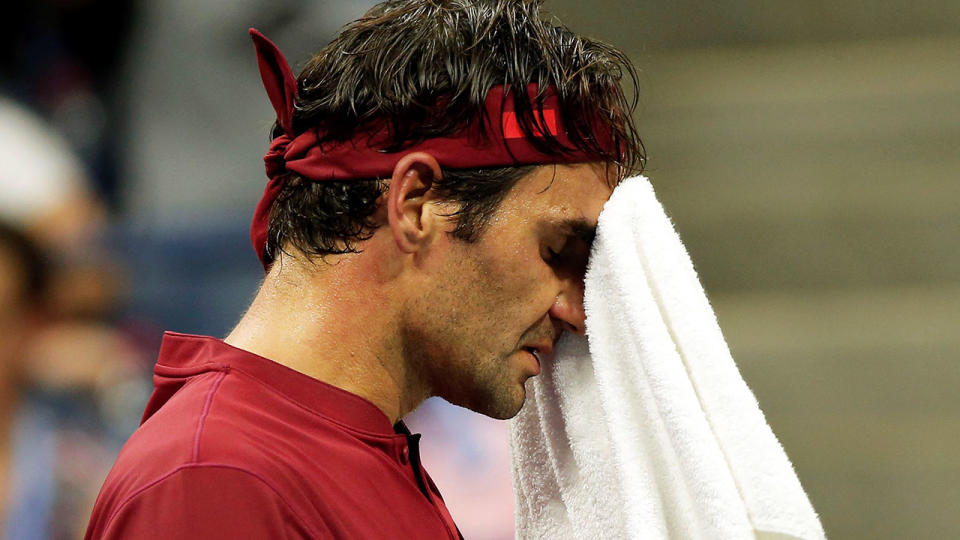Bizarre NY Times theory links Federer loss to global warming
A New York Times report suggesting Roger Federer became a “spokesman for climate change” following his shock US Open loss to Aussie John Millman has created a firestorm.
The report, entitled ‘Roger Federer Is Tough to Beat. Global Warming Might Have Pulled an Upset’, stated Federer had become “an unwitting spokesman for the effects of climate change” after he complained about the heat following his stunning round of 16 exit.
Reporter Kendra Pierre-Louis explained how Federer was ruined by the combination of heat and humidity on Tuesday (AEST), with the heat index, which indicates a ‘feels like’ temperature, in the 90s.

The temperature on the night at Arthur Ashe Stadium in New York hovered around 30 degrees Celsius.
Jake Crouch a scientist at National Oceanic and Atmospheric Administration, labelled those measurements as “incredible” for a September night.
“That’s a hot heat index (more commonly seen) in the middle in the middle of summer, in the middle of the day, for New York,” Crouch told The Times.
“At 10:51 p.m. the heat index was 95 — that’s pretty incredible. That’s a hot heat index in the middle of the summer, in the middle of the day, for New York.” https://t.co/GuiC09pkN2
— NYT Climate (@nytclimate) September 4, 2018
But while its near impossible to argue it’s getting hotter, and the temperature for Federer’s match was unseasonably hot, to state ‘global warming pulled an upset’ and Federer had become a “spokesman” for the phenomenon seemed a step too far for many tennis fans.
This is NOT a joke –>
NY Times blames global warming for Roger Federer's stunning upset last night at the U.S. Open https://t.co/L1WbuA9BzU pic.twitter.com/77dQ3B2T9A— Ryan Maue | weathermodels.com (@RyanMaue) September 5, 2018
What? How do you reach that far?!
— Bert Kallio 🐄🍾 (@bert_kallio) September 5, 2018
Nadal already down a break, global warming strikes twice.
— Bill Ozanne (@BillOzanne) September 5, 2018
More #FakeNews from @nytimes… no surprise here.
— G. William Tasker (@gwilliamtasker) September 5, 2018
Just read the article. It’s quite a reach to make your claim! Introductory paragraphs are meant to be tongue in cheek…a journalistic tool!
— Glenn Pacheco (@glen_in_ma) September 5, 2018
Aussie basketball star Andrew Bogut even fired up about the piece, joking that he thought he was reading satirical site ‘The Onion’.
The Onion have done it again…..wait what? 🙈 https://t.co/BBZqStYnGB
— Andrew Bogut (@andrewbogut) September 5, 2018
Federer himself was quoted in the article, explaining how the heat and humidity had an impact on his output.
“It was hot. It was just one of those nights where I guess I felt I couldn’t get air; there was no circulation at all,” Federer said.
“I just struggled in the conditions. It’s one of the first times it’s happened to me.
“It’s uncomfortable. Clearly just kept on sweating more and more and more and more as the match goes on. You lose energy as it goes by.”
Federer also stated his opponent, Brisbane-based John Millman, had a huge advantage, given the climate he is accustomed to.
“John was able to deal with it better. He maybe comes from one of the most humid places on earth, Brisbane!” Federer said.
The Swiss maestro also took a jab at tournament organisers for their decision to build a roof on Arthur Ashe Stadium.
Federer argued the structure around the new roof stopped air flow into the court, whether the roof is open or not.
“I do believe since the roof is on that there is no air circulation in the stadium. I think just that makes it a totally different US Open,” the world number two said.
“Plus conditions maybe were playing slower this year on top of it. You have soaking wet pants, soaking wet everything.
“It was just tough. I thought John played a great match in difficult conditions.”